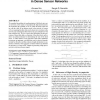1542 search results - page 13 / 309 » The Observational Power of Clocks |
FPL
2010
Springer
13 years 5 months ago
2010
Springer
The paper describes application of the clock-gating techniques, often used in ASIC designs, to the field of FPGAbased systems. The clock-gating techniques are used to reduce the to...
ISPD
2004
ACM
14 years 25 days ago
2004
ACM
Modern processors and SoCs require the adoption of poweroriented design styles, due to the implications that power consumption may have on reliability, cost and manufacturability ...
WSNA
2003
ACM
14 years 20 days ago
2003
ACM
We consider the problem of synchronization of all clocks in a sensor network, in the regime of asymptotically high node densities. We formulate this problem as one in which all cl...
DAC
2008
ACM
13 years 9 months ago
2008
ACM
Clock skew scheduling has been traditionally considered as a tool for improving the clock period in a sequential circuit. Timing slack is "stolen" from fast combinationa...
ICCAD
2005
IEEE
14 years 4 months ago
2005
IEEE
— Although the LUT (look-up table) size of FPGAs has been optimized for general applications, complicated designs may contain a large number of cascaded LUTs between flip-flops...

